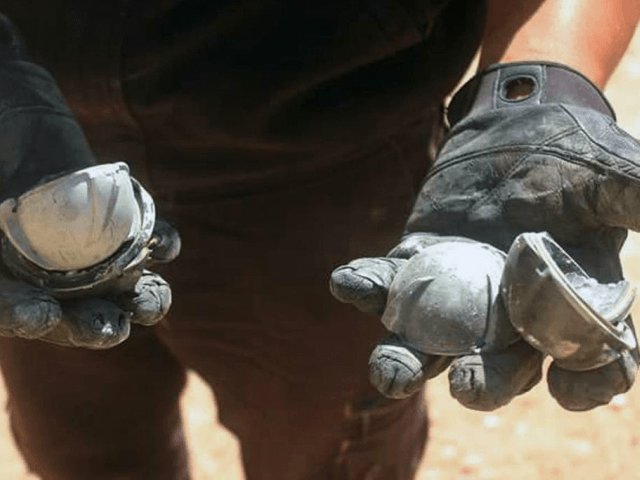An NGO specializing in the proliferation of cluster bombs released a report Thursday at the United Nations accusing the communist government of North Korea of continuing to build and stockpile the weapons.
The report follows similar warnings from other international institutions that North Korea has also done little to dismantle its illegal nuclear program or display any goodwill regarding an end to the belligerence that has defined dictator Kim Jong-un’s regime. It also surfaces shortly after President Donald Trump canceled a planned trip by Secretary of State Mike Pompeo to Pyongyang for ongoing nuclear talks, lamenting that now was not to time to have such in-person discussions.
Cluster bombs are explosives typically dropped by aircraft that dissolve into smaller explosives, thus creating “clusters” of explosions and causing a wider range of damage. The result is typically widespread and unfocused destruction that hurts civilians more than soldiers or strategic targets, which has led to a global outcry to ban them.
The Cluster Munition Coalition, an NGO dedicated to the eradication of these weapons, told UN officials on Thursday that North Korea acquired many of its cluster bombs after the collapse of the Soviet Union, but has since continued to manufacture them, according to the South Korean outlet Yonhap, citing Radio Free Asia. The organization did not specify whether it had evidence that North Korea had used any of its cluster bombs, however, but said there was no evidence to show that Pyongyang was interested in complying with international legal norms and disposing of them.
The report follows a similar one revealing that the Kim regime appears not to be making any moves toward entering the community of responsible nations submitted by the International Atomic Energy Agency (IAEA), the UN’s nuclear watchdog agency. The IAEA accused North Korea this month of making no perceivable moves towards denuclearization, despite dictator Kim Jong-un promising at meetings with both South Korean President Moon Jae-in and President Trump that his nation would work towards the “denuclearization of the Korean Peninsula.”
“The continuation and further development of the DPRK’s [North Korea’s] nuclear programme and related statements by the DPRK are a cause for grave concern,” the IAEA suggested in its report.
North Korean officials have yet to define what they meant by promising to work towards the “denuclearization of the Korean peninsula.” Skeptics have suggested that Pyongyang is seeking the complete removal of American military assets from the region, as the U.S. is a legitimate nuclear power, rather than the dissolution of its illegal nuclear program. North Korean officials have, however, organized several displays meant to convince the public that they will no longer produce nuclear weapons.
In May, shortly before the Trump-Kim summit, Pyongyang announced the permanent closure of the Punggye-ri Nuclear Test Site on Mount Mantap, which satellite images revealed had been severely damaged by the past two nuclear weapons tests it underwent in 2017. North Korea charged journalists from around the world $10,000 for visas to attend the symbolic closure of the site and blocked anyone believed to have professional nuclear expertise from examining the site to confirm that it would not longer function as part of North Korea’s nuclear program.
Subsequent reports suggest that North Korea is using other sites to manufacture nuclear missiles and other assets for its nuclear program. This week, National Interest reported that North Korea appears to be investing in the “construction of a second ballistic-missile submarine” that may ultimately carry nuclear weapons.
In response to these reports, the United States has not moved to lift sanctions on North Korea, currently under an unprecedentedly harsh international sanctions regime. Washington’s refusal to aid the North Korean economy has appeared to distress Pyongyang, and the lack of progress on denuclearization has stalled talks. President Trump announced last week that Secretary Pompeo would not be making a scheduled visit to North Korea this week and would wait for a riper diplomatic opportunity. North Korea’s state media has not mentioned the canceled visit, but has condemned the United States for an unspecified “criminal plot” against the country.

COMMENTS
Please let us know if you're having issues with commenting.